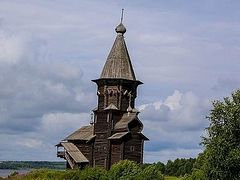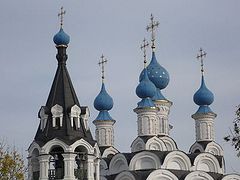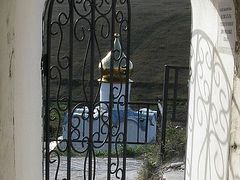 In my youth, when, as things turned out, I was leaving my parents’ house forever, I had a dream that for some reason became fixed in my memory.
In my youth, when, as things turned out, I was leaving my parents’ house forever, I had a dream that for some reason became fixed in my memory.
There was absolutely nothing special in it and it is strange that I memorized it. In that dream I only received a postcard with the return address on it: my own initials and, “Rybinsk Reservoir”. This was the whole dream—nothing interesting.
And only recently, as the memories of my childhood and adolescence became more and more frequent, appearing in my mind like phantoms of ships that sank many years ago, I understood what that address on the postcard—with my initials in the “sender” field—meant.
The old folk whom I particularly loved: my grandfather, grandmother, and other villagers – appear before me in my mind very often.
We are sitting in front of my grandfather’s house on the “zavalinka” (a mound of earth along the outer walls of a Russian peasant’s house used for its protection from cold weather and for sitting on it at leisure) in Biryusinsk, 18 Krasnoy Zvezdy Street. My granny, myself (a five-year-old child), two other elderly women, and our unforgettable neighbor, uncle Kolya.
We are playing “Fool” (a popular Russian card game) and having great fun.
But the culmination of the fun begins when uncle Kolya “is fooled” (that is, loses the game), and I already for the thousandth time demand his glass eye as a “penalty” for the loss.
Then uncle Kolya lets me sit on his lap and begins his show, his “star performance”.
One, two—and uncle Kolya’s eye, his own eye, is in his hands! I am filled with horror and delight! Uncle Kolya was permeated with the smell of low-grade tobacco and sauerkraut soup (“sour shchi” in Russian), bald and eyebrowless, is breaking into a contented smile (his teeth gleaming with gold) and chuckling in silence. He is like Koshchey the Deathless (in Russian fairy tales a very old, rich and powerful evil magician who will die only when a treasured needle is broken), so I start squealing, crying, but, nevertheless, excitedly clapping my hands.
Meanwhile, our grandad is looking out of the window and calling out across the street, “Girls, supper is ready!”
As I was told later, nowhere else in Biryusinsk and its surroundings have grandads ever cooked supper for their grannies who were at that time playing cards in front of their houses.
And my grandmother and I briskly went inside our house to eat up our fried eggs (sunny side up) and to wash them down with turya (a traditional Russian peasants’ cold “summer” soup with kvass or milk and wheat or rye bread) with cold milk.
Later in the evening granny Dunya might look in on our family. She was a little, stocky old woman who for some reason exclusively wore a blue woolen shawl and a faded brown raincoat in any weather. Granny Dunya smelt bad and she constantly sighed and repeated, “Oh, my God, my God!”
I did not have any special sympathy for granny Dunya and sometimes used to say: “Here comes ‘OmyGod’!” But my grandmother reprimanded me for this, fed granny Dunya with all she could find in our house, gave her unsweetened tea to drink while holding a piece of sugar in her mouth (according to the old Russian tradition) and listened to her mournful lamentations for hours.
Granny Dunya lived all alone; her children abandoned her, and my grandparents became her only friends who helped her with money, food and clothes.
At times my grandmother asked Dunya to sing her “the Cherubic Hymn”. And she sang it, with her strident, trembling old woman’s voice. Sorrowfully, fascinatingly and in an inviting manner…
And my grandmother secretly brushed away drops of tears and wiped her eyes with edge of her headscarf.
And I would sit on the stool, chew on my fingers, dangle my legs, and cast a puzzled glance at two weeping old women.
And now, all of them, like Mologa (a lost medieval Russian town in the Yaroslavl region, which was literally entirely flooded and engulfed at Stalin’s orders in 1935 during the construction of the Rybinsk Reservoir) from the bottom of the Rybinsk Reservoir, are coming to me in memories and dreams—calling, waiting for mutual love, asking me not to forget them.
And I can’t sit light-heartedly on the stool and dangle my legs any more…




